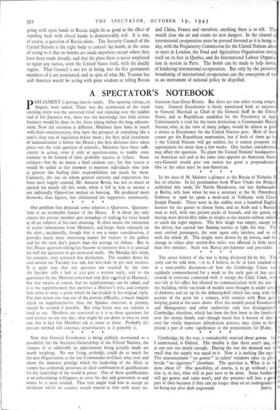One problem that demands some solution is Questions. Question- time
is an invaluable feature of the House. It is about the only chance the private member gets nowadays of making his voice heard at all on subjects of his own choosing. It often means the extraction of useful information from Ministers, and keeps them salutarily on the alert ; incidentally, though that is not a major consideration, it provides much more interesting matter for visitors in the gallery and for the next day's papers than the average set debate. But in this House question-asking has become sO intensive that it is unusual for half the questions to get answered orally. On Monday this week, for example, sixty achieved that distinction. The number down for oral answer on Tuesday was 196, but less than 70 got oral answers. It is quite true that any question not reached by the time the Speaker calls a halt at 3.15 gets a written reply, sent to the questioner by the Minister concerned and duly reported in Hansard ; but that means, of course, that no supplementary can be asked, and it is the supplementary that exercises a Minister's wits, and compels him often to meet a point which he has evaded in his original reply. For that reason one way out of the present difficulty, a much sharper check on supplementaries than the Speaker exercises at present, should be avoided if possible. But what better way out remains is hard to see. Members are restricted as it is to three questions for oral answer on any one day ; that might be cut down to two, or even one, but in fact few Members ask as many as three. Probably the present method will continue, unsatisfactory as it palpably is. * * * *


























 Previous page
Previous page